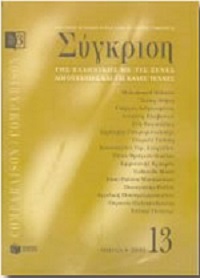Heteroglossic discourse and re-composition in Odysseus Elytis ' Sappho
Abstract
An unexplored, but significant, aspect of the poetics of the work of Odysseus Elytis is his complex reception of the poetry and the figure of Sappho. This article, a small 'fragment' of a wider investigation into the reception of Sappho by Elytis and other Greek modernists, explores his reconstruction and translation of Sappho's poetic corpus. I argue here that Elytis' Sappho (1984) articulates a double discourse: on one level Elytis re-composes Sappho's poetics in a highly intricate manner, and on another level, he foregrounds his own lyrical identity and his affinities with the primordial indigenous symbol of lyricism. If in his collages the heterogeneous elements derive from the synthesis of deliberately fragmented images, in his re-composition of Sappho the métonymie material comes from the fragmented Sapphic corpus and from his own internal intertext. The result is the re-creation of poetic collages (syn-images / συν-εικόνες») where Elytis' voice is inscribed in Sappho's poetic discourse to re-articulate it by means of a heteroglossic ventriloquism. In this manner Elytis' Sappho constitutes a complex case of the construction of the literary self: by means of his function as reader and writer of the Sapphic corpus, and through a paradoxical combination of his act of depersonalization, on the one hand, and his appropriation of the Sapphic persona, on the other, Elytis produces a new reading and re-writing both of an exemplary poetic subject and of his own literary self.
Article Details
- How to Cite
-
Γιατρομανωλάκης Δ. (2017). Heteroglossic discourse and re-composition in Odysseus Elytis ’ Sappho. Comparison, 13, 60–72. https://doi.org/10.12681/comparison.10132
- Issue
- Vol. 13 (2002)
- Section
- Articles

This work is licensed under a Creative Commons Attribution-NonCommercial-ShareAlike 4.0 International License.
Authors who publish with this journal agree to the following terms:
- Authors retain copyright and grant the journal right of first publication with the work simultaneously licensed under a Creative Commons Attribution Non-Commercial License that allows others to share the work with an acknowledgement of the work's authorship and initial publication in this journal.
- Authors are able to enter into separate, additional contractual arrangements for the non-exclusive distribution of the journal's published version of the work (e.g. post it to an institutional repository or publish it in a book), with an acknowledgement of its initial publication in this journal.
- Authors are permitted and encouraged to post their work online (preferably in institutional repositories or on their website) prior to and during the submission process, as it can lead to productive exchanges, as well as earlier and greater citation of published work (See The Effect of Open Access).



